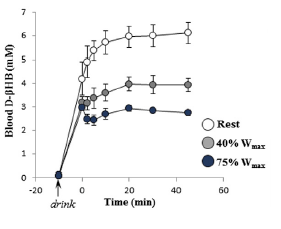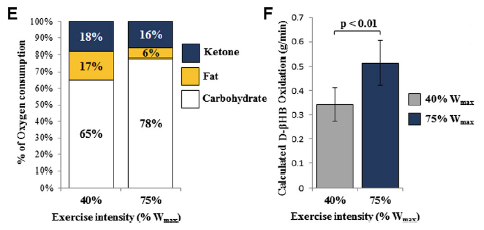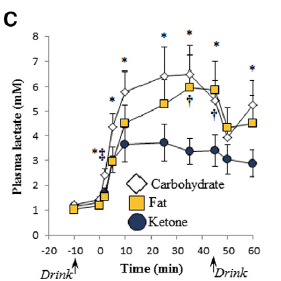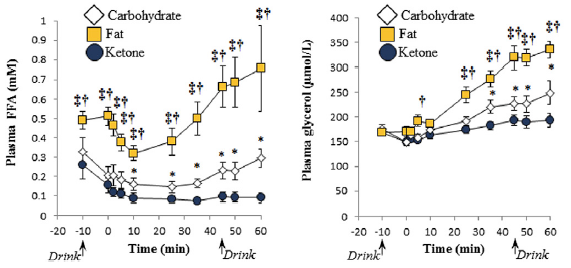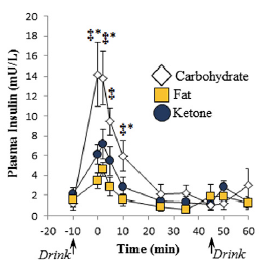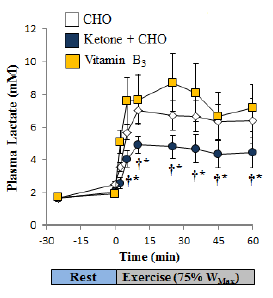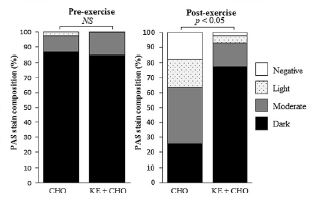Or more specifically, ketone monoesters and carbs. Literally, this study was a high-dose ketone monoester supp sans caloric or carb restriction. I know, weird right?
Non sequiter nutrition notes, #context, etc.:
1) ketone esters =/= ketone salts. Ketone salts are either sodium or potassium-dominant. Ketone esters are essentially salt-free. Possibly helpful background reading here.
2) nutritional ketosis =/= starvation ketosis =/= ketone supp ketosis. Because #context.
Starvation ketosis, but not nutritional ketosis, is muscle-sparing. Ketone supps sans carb restriction might be.
3) the theory of ketone supps for sport is: 1) ketones are an energetically favorable fuel; and 2) they’ll spare glycogen, theoretically allowing prolonged duration of moderate-to-high intensity performance. Adding in carbs will likely further this.
4) I have no studies to support this, but the idea of ketone supps in the #context of high carb doesn’t sit will with me. Seems like high levels of both substrates = mitochondrial overload and oxidative stress. Maybe.
5) there’s a gradient of fuel use during exercise:
-explosive power: creatine, anaerobic
-high intensity: glycogen, anaerobic
-low intensity: fatty acid oxidation, aerobic
But it’s a gradient with a lot of overlap, and ketoadaptation further blurs the lines.
divide and conquer
n=6, male endurance athletes
Ketone monoester supplementation led to a pretty high level of ketones (45g dose = 6mM!), and exercise drained them:
The reason you see the lines plateau and not decline (as if the ketones were continually being oxidized) is because they’re still being absorbed from the gut, and they are continually being oxidized. Absorption and/or production minus clearance = “metabolic flux.”
At higher workloads, ketone oxidation declined as a percentage of total fuel oxidation, but total ketone oxidation increased (leading to lower blood levels) because total energy expenditure is elevated:
“Estimated d-BHB oxidation during steady state exercise increased from 0.35 g/min at 40% WMax to 0.5 g/min at 75% intensity.”
Part 2. Exercise study comparing fat to carb to ketone monoester
Here’s where the lines begin to blur, ie, where it gets interesting:
Exercising at a relatively high intensity is going to use a lot of carb, which produces lactate, and slugging down some butter isn’t going to change this (compare carb [open diamonds] and fat [yellow squares])… in contrast to ketoadaption, or in this case, ketone monoester (blue circles). Ketone supps make anaerobic work appear more aerobic; in other words, ketones allow you to burn fewer carbs at the same relative intensity.
If you interested in this kind of stuff, Nanci Guest and Tim Noakes have been debating it relentlessly on Twitter lately.
Moving on, ketones blunt lipolysis, even more so than carb:
…NOT because insulin:
Part 3. Cool study: dissociating effects of ketone receptor activation and ketosis.
Nicotinic acid activates the ketone receptor, which inhibits lipolysis. Inhibition of lipolysis increases, whereas ketones decrease, the reliance on glycogen during exercise; ergo, highest lactate with nicotinic acid and lowest with ketones, reflecting highest and lowest carb burning:
As expected and mentioned above in the “non sequiter nutrition notes,” ketones suppress glycogen use during exercise. In the figure below, dark staining reflects muscle glycogen:
Part 4. Physical performance study
1 hour cycling at 75% max (glycogen-depleting), followed by 30 minute all-out sprint for distance.
Carb group made it 20.1 kilometers vs. carb + ketone group made it 20.5 km. 2% further (P<0.05 haha).
Conclusion
Ketone monoesters are ridiculously expensive, so no-go for weekend warriors or recreational athletes. If you’re literally going for a Gold Medal, then a 2% improvement might make a difference.
Alternatively [theoretically], a carb-adapted metabolism might do just as well with a ketone boost as a ketoadapted metabolism would do with a carb boost (this appears to be how some of the elite “n=1” LC athletes do it). But still, it’s like 100x less expensive to be ketoadapted & have some carbs than be carb-adapted and take ketone monoesters. So, unless there’s a Gold Medal on the line or you have a money tree… ymmv.
So, throwing some ketone monoesters into your pre-workout drink might improve net physical performance, depending on your sport. But then there’s that other issue, that elevated ketones and glucose = no bueno. Acute physical performance boost at the expense of healthspan? Idk.
#context
For full access to all articles and much more (or if you just like what I do and want to support it), become a Patron! It’s three bucks a month and there are many other options. Sign up soon because there are only a limited number of spots left at the $3 level. It’s ad-free and you can cancel if it sucks ????
Also, I’m open to suggestions, so please don’t hesitate to leave a comment or contact me directly at drlagakos@gmail.com.
Affiliate discounts: if you’re still looking for a pair of hot blue blockers, Carbonshade is offering 15% off with the coupon code LAGAKOS and Spectra479 is offering 15% off HERE. TrueDark is running a pretty big sale HERE. If you have no idea what I’m talking about, read this then this.
20% off some delish stocks and broths from Kettle and Fire HERE.
If you want the benefits of ‘shrooms but don’t like eating them, Real Mushrooms makes great extracts. 10% off with coupon code LAGAKOS.


